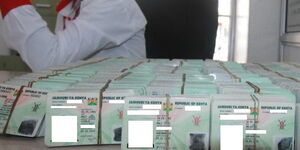The Tax Appeals Tribunal has ruled that the Kenya Revenue Authority (KRA) could deem all deposits to a bank account as taxable income if there is insufficient proof to the contrary.
If you own a business in Kenya, you are subject to a series of taxes, including the corporate income tax, which is levied on the company's taxable profits calculated by subtracting all legitimate business expenses from the total gross income.
However, the money deposited in a business account is not taxed directly on the deposit itself but on the sources of income that result in deposits being made.
Some of the allowable expenses include salaries, rent, utility bills, marketing costs and certain capital allowances and must be supported by an eTIMS-generated electronic tax invoice.
In a ruling of the Tribunal Appeal E1116 of 2024 issued on September 2, however, the tribunal determined that the appellant, a pipe manufacturing company, could not support the assertion that some of its deposit was mere capital injections and loans, not taxable income.
The Case
The company had filed the appeal, claiming that KRA had made an error by assuming that every deposit made into its bank accounts in the period between 2019-2022 amounted to income capable of being charged tax.
Since the company began operations in 2019, it argued that shareholders injected share capital in that year and that the ordinary share capital was Ksh100 million.
Furthermore, the company reportedly needed more capital and therefore shareholders deposited a further Ksh29,425,495.45 into its bank account, insisting it was not income but a capital injection.
An additional Ksh31,697,392 was reportedly acquired as a loan, and an additional Ksh24,619,662 from the shareholders to fund its operations, all of which the company argued should not have been subjected to income tax by KRA.
The Ruling
In its ruling, the tribunal determined that the appellant failed to provide an analysis of the specific deposits which related to capital injections and to link the deposits to the shareholders.
It further held that the pipe manufacturer provided uncertified bank statements and swift confirmation slips, which could not be attributed to capital deposits in the absence of other corroborative documents, such as an analysis and description of the deposits, Meeting Minutes/ Resolutions or any other document to demonstrate that indeed the amounts in question were capital injections.
As for the Ksh31,697,392, the tribunal held that the documents indicated that it was interest-free and the same could be repaid at any time at the discretion of the company; thus, such open terms made it difficult to verify whether the amount was indeed a loan, given that there was neither interest charged nor a repayment period.
It further found that from the date the loan agreement was signed in 2019 to the date of assessments in 2024, the company did not provide proof of any repayments it made towards the said financier.












